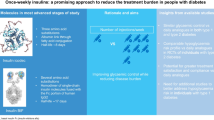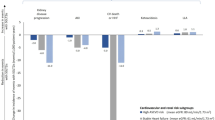Abstract
Background
Pre-pregnancy care improves pregnancy outcomes in type 1 diabetes mellitus (T1DM). Continuous subcutaneous insulin infusion (CSII) therapy and multiple daily injection (MDI) therapy can both be used to achieve glycaemic targets, but few data are available to compare their efficacy in pre-pregnancy care.
Aim
To compare MDI and CSII in pre-pregnancy care in T1DM.
Methods
Retrospective database review of women with T1DM attending the Dublin Diabetes in Pregnancy Centre.
Results
464 women with T1DM (40 treated with CSII) were included. Women attending for pre-pregnancy care had lower HbA1c levels at booking to antenatal services [52 ± 10 mmol/mol (6.9 ± 0.9 %) vs. 62 ± 16 mmol/mol (7.8 ± 1.5 %), p < 0.001], and booked at an earlier gestation (6 ± 2 vs. 8 ± 6 weeks, p < 0.001). In those who attended for pre-pregnancy care, the CSII group had lower HbA1c levels at booking than those using MDI [48 ± 8 mmol/mol (6.5 ± 0.7 %) vs. 53 ± 10 mmol/mol (7.0 ± 0.9 %), p = 0.03]. Gestational age at delivery and birth weight did not differ between groups. Caesarean section rates were associated with CSII use (p < 0.001), duration of diabetes (p = 0.002), and parity (p = 0.006). Nulliparous women using CSII with a longer history of diabetes were more likely to deliver by Caesarean section. There was no perinatal mortality.
Conclusions
Pre-pregnancy care delivered by a specialist multi-disciplinary team effectively reduces HbA1c levels peri-conception. CSII use results in lower HbA1c levels in pre-pregnancy care in selected individuals and should be considered in women with T1DM planning pregnancy.
Similar content being viewed by others
References
Temple R, Aldridge V, Greenwood R, Heyburn P, Sampson M, Stanley K (2002) Association of outcome of pregnancy and glycaemic control in early pregnancy in type 1 diabetes: a population based study. BMJ 325(7375):1275–1276
Jovanovic L, Knopp RH, Kim H et al (2005) Elevated pregnancy losses at high and low extremes of maternal glucose in early normal and diabetic pregnancy: evidence for a protective adaptation in diabetes. Diabetes Care 28(5):1113–1117
Macintosh MC, Fleming KM, Bailey JA et al (2006) Perinatal mortality and congenital anomalies in babies of women with type 1 or type 2 diabetes in England, Wales and Northern Ireland: population based study. BMJ 333(7560):177
Ray JG, O’Brien TE, Chan WS (2001) Preconception care and the risk of congenital anomalies in the offspring of women with diabetes mellitus: a meta-analysis. QJM 94(8):435–444
Pearson DW, Kernaghan D, Lee R, Penney GC, Scottish Diabetes in Pregnancy Study Group (2007) The relationship between pre-pregnancy care and early pregnancy loss, major congenital anomaly or perinatal death in type 1 diabetes mellitus. BJOG 114(1):104–107
National Institute for Health and Clinical Excellence. Diabetes in pregnancy: management of diabetes and its complications from pre-conception to the postnatal period. London: NICE, 2008. http://www.nice.org.uk/CG063
Kitzmiller JL, Block JM, Brown FM et al (2008) Managing preexisting diabetes for pregnancy: summary of evidence and consensus recommendations for care. Diabetes Care 31(5):1060–1079
Mukhopadhyay A, Farrell T, Fraser RB, Ola B (2007) Continuous subcutaneous insulin infusion vs intensive conventional insulin therapy in pregnant diabetic women: a systematic review and meta-analysis of randomized, controlled trials. Am J Obstet Gynecol 197(5):447–456
Jeitler K, Horvath K, Berghold A et al (2008) Continuous subcutaneous insulin infusion versus multiple daily injections in patients with diabetes mellitus: systematic review and meta-analysis. Diabetologia 51(6):941–951
Cypryk K, Kosinski M, Kaminska P, Kozdraj T, Lewinski A (2008) Diabetes control and pregnancy outcome in women with type 1 diabetes treated during pregnancy with continuous subcutaneous insulin infusion or multiple daily injections. Pol Arch Med Wewn 118(6):339–344
Chen R, Ben-Haroush A, Weismann-Brenner A, Melamed N, Hod M, Yogev Y (2007) Level of glycaemic control and pregnancy outcome in type 1 diabetes: a comparison between multiple daily injections and continuous subcutaneous insulin infusions. Am J Obstet Gynecol 197(4):404.e1–404.e5
Cummins E, Royle P, Snaith A et al (2010) Clinical effectiveness and cost-effectiveness of continuous subcutaneous insulin infusion for diabetes: systematic review and economic evaluation. Health Technol Assess 14(11):iii–iv, xi–xvi, 1–181
Cyganek K, Hedba-Szydio A, Katra B et al (2010) Glycemic control and selected pregnancy outcomes in type 1 diabetes women on continuous subcutaneous insulin infusion and multiple daily injections: the significance of pregnancy planning. Diabetes Technol Ther 12(1):41–47
Owens LA, Avalos G, Kirwan B, Carmody L, Dunne F (2012) ATLANTIC DIP: closing the loop: a change in clinical practice can improve outcomes for women with pregestational diabetes. Diabetes Care 35(8):1669–1671
Wahabi HA, Esmaeil SA, Fayed AA, Al-Shaikh G, Alzeidan RA (2012) Pre-existing diabetes and adverse pregnancy outcomes. BMC Res Notes 5(1):496
Shalitin S, Gil M, Nimri R, de Vries L, Gavan MY, Phillip M (2010) Predictors of glycaemic control in patients with type 1 diabetes commencing continuous subcutaneous insulin infusion therapy. Diabet Med 27(3):339–347
Sibai BM, Caritis SN, Hauth JC et al (2000) Preterm delivery in women with pregestational diabetes mellitus or chronic hypertension relative to women with uncomplicated pregnancies. The National institute of Child health and Human Development Maternal- Fetal Medicine Units Network. Am J Obstet Gynecol 183(6):1520–1524
Mimouni F, Miodovnik M, Siddiqi TA, Berk MA, Wittekind C, Tsang RC (1988) High spontaneous premature labor rate in insulin-dependent diabetic pregnant women: an association with poor glycemic control and urogenital infection. Obstet Gynecol 72(2):175–180
Abu-Heija A, Rasheed R, el-Qaraan O (1998) Effect of age and parity on primary caesarean section rates. Clin Exp Obstet Gynecol 25(1–2):38–39
Beyer DA, Amari F, Ludders DW, Diedrich K, Weichert J (2011) Obesity decreases the chance to deliver spontaneously. Arch Gynecol Obstet 283(5):981–988
Hanson U, Persson B, Thunell S (1990) Relationship between haemoglobin A1c in early type 1 (insulin-dependent) pregnancy and the occurrence of spontaneous abortion and feral malformation in Sweden. Diabetologia 33(2):100–104
Acknowledgments
The authors would like to acknowledge the Eithne Coleman, Laura O’Shea and Ailbhe McCarthy who contributed to the care of the women in this study, and who also aided in data collection. This clinical research project did not receive any specific funding.
Conflict of interest
The authors have no conflicts of interest to disclose. No competing financial interests exist.
Author information
Authors and Affiliations
Corresponding author
Rights and permissions
About this article
Cite this article
Neff, K.J., Forde, R., Gavin, C. et al. Pre-pregnancy care and pregnancy outcomes in type 1 diabetes mellitus: a comparison of continuous subcutaneous insulin infusion and multiple daily injection therapy. Ir J Med Sci 183, 397–403 (2014). https://doi.org/10.1007/s11845-013-1027-6
Received:
Accepted:
Published:
Issue Date:
DOI: https://doi.org/10.1007/s11845-013-1027-6




